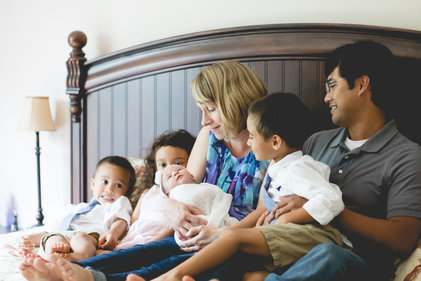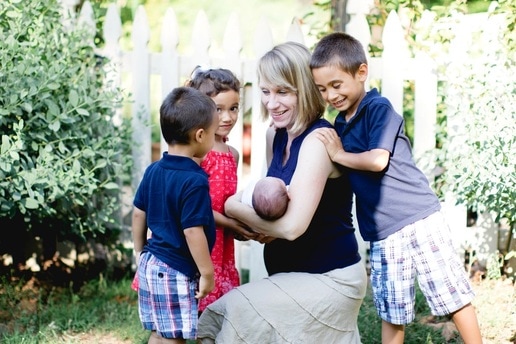|
“Good Catholic women don’t feel like this. Surely I’m the only one.” As a mama of four and a three-time overcomer of postpartum depression and anxiety, these words have echoed through my mind countless times. Postpartum depression is so very isolating and deceiving. I’m happy to know the truth now — that 1 in 7 mothers will develop postpartum depression within the first year after their baby’s birth, that PPD can happen to anyone, and most importantly, that hope and healing are possible. Whether you're a new mama or a veteran, the first year postpartum can be one of the most beautiful and most difficult of your life. Real life with a newborn isn't the highlight reel that we see on so many social media feeds. The sweet snuggles, tiny toes, and milky smiles go hand-in-hand with sleepless nights, crazy hormones, and a big dose of "How am I going to do this?!" Throw in a postpartum mood disorder -- like postpartum depression or anxiety -- and you can feel like you're drowning. So how do you know if you're experiencing the “baby blues,” or something more? What are the hallmark signs of postpartum depression? And how do you begin to heal? If you find yourself asking these questions right now, you’re not alone. Here are three facts every mama should know about PPD, and two things you can do to begin to feel better right now. PPD is not the “baby blues.” The “baby blues” are a common experience after childbirth, affecting up to 80% of new moms. Symptoms include mood swings, tearfulness, irritability, and anxiousness that usually begin 3-4 days after childbirth. They resolve on their own within 2 weeks postpartum. While PPD and the baby blues share some of the same symptoms, they are very different. Because it’s an actual mood disorder, PPD is much more serious. Symptoms of PPD have a wide range and don’t always match our idea of what depression should look like. PPD can actually begin anytime within the first year after childbirth, and symptoms will last for more than two weeks. Many women experience depressed mood, drastic changes in appetite, or a loss of interest in their normal activities. Others will also have symptoms of increased anger, feeling “out of control,” or a deep sense of guilt or worthlessness. Often, a mama with PPD has difficulty bonding with her new baby, or will excessively worry about her baby’s safety. And some mamas will also suffer recurring thoughts of death or suicide. (For a detailed symptom list, go HERE.) The bottom line: if you’re consistently just not feeling like yourself postpartum, then PPD may be an issue. It won't hurt to bring your concerns to your doctor or loved ones. PPD is not your fault. It’s so easy for a mama with PPD to beat herself up with the lie that if she just loves her kids more, or if she just prays harder, or if she were just a better mother, then she wouldn’t feel this way. No! Sweet mama, this is not your fault. There are a myriad of factors that can contribute to a postpartum mood disorder — hormonal changes, life stressors, lack of social support, thyroid problems, and sleepless nights can all wreak havoc on a postpartum mom’s mind and body. So don’t blame yourself. Instead, ask the Lord to help you to find healing. Because there’s good news! PPD is treatable. When I was at my darkest after the birth of my second baby, I was sure that I would be depressed forever. It seemed impossible that I would ever be happy again. If you feel this way, too, take courage! There are many effective ways to combat PPD. Among them are counseling, medications, targeted supplements (such as with progesterone), consistent exercise, and excellent nutrition — and often, the best treatment is a combination of some or all of these. It does take time and effort to discover the best ways to treat PPD in each woman. But if you’re suffering now, there are two things you can do to begin to feel better right away. First, open your heart to your spouse or a trusted friend. Let them know that you’re feeling badly, that you’re scared, and that you need their support. Just saying the words out loud will bring some peace. There is no shame in needing help, and no sense in carrying your burden alone. Second, ask a loved one to assist you in seeing a professional. Something as serious as PPD can be resolved best when under the careful and gentle watch of a doctor, midwife, psychiatrist, or other provider. The sooner you make the call, the sooner you will be on the road to getting the help you deserve. But you shouldn’t have to figure it out by yourself. Tell your loved ones that you need their support in finding and calling a doctor; they can even go with you to the appointment. Ask them to help you today! Dear beautiful mama, PPD is not forever, and you do not have to go it alone. I’ve been there three times, and from the other side I can say, there is hope — you will be well again! For more information on postpartum depression and other postpartum mood disorders, see Flourish in Hope or Postpartum Support International.
3 Comments
Lenetta
6/21/2017 04:17:07 pm
I'm so glad to see you mention progesterone. It was a life saver for me after the birth of my third. I contacted the Pope Paul VI Institute in Omaha and was able to do everything over the phone. I will have a prescription in hand when I go into labor with #4 in a few months.
Reply
6/24/2017 05:43:05 pm
Thanks for writing. I am glad you have figured out what you need in your toolbox. I will remember to pray for you as you near the birth of your 4th. Blessings and graces for a happy and healthy birth.
Reply
Leave a Reply. |
AuthorRebecca Dussault Archives
April 2023
Categories |


 RSS Feed
RSS Feed